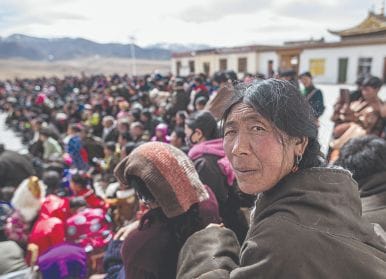Is Tibetan society male-dominated? Do women lack equality? Most Tibetans feel these are not issues that warrant discussion, as overall the position of Tibetan women is relatively good. There may be discrimination regarding sending a boy over a girl for studies, but this is a matter for their parents rather than a social trend. Female infanticide never happened. There is no dowry system. Widows can remarry. Though it is a religious society, there are no proscriptions to control women’s sexuality. A Tibetan man doesn’t expect his new wife to be a virgin. Tibetan women are free to choose any career, husband, or stay single. [caption id=“attachment_6268481” align=“alignleft” width=“386”]  Tibetans in McLeodganj[/caption] The idea of feminism is new to Tibetans-in-exile. There are few ‘card-carrying’ Tibetan feminists. In general, Tibetan women seem to disapprove of any radical or anti-men feminism. When Western women come to volunteer at the Tibetan Women’s Association (TWA), they often come with the idea of working for women’s rights, but find themselves working on the Free Tibet movement. They may have found the condition of Tibetan women with regard to men to be actually exceeding that of Western women. But there is now a small number of Tibetan women feminists, and there are some men too, including Tibet’s spiritual leader the Dalai Lama, as well as myself. Though Tibetan women do generally play an equal role in society, there are fewer in leadership and political positions. Tibetans, both men and women, pray not to be reborn as a woman but as a man in their next life. It’s not clear if this is a cultural trend, or comes from their Buddhist beliefs. It is believed that it is difficult to attain enlightenment in a woman’s body because women are said to have more ‘defilements’ such as desires, anger, hatred, and jealousy. In the Tibetan Buddhist monastic community, nuns had been denied higher education, but that has changed. The Dalai Lama, going against traditions, asked the nuns to pursue the same higher studies as monks. In 2016, the first Geshemas, a degree equivalent to doctorate in philosophy, were conferred on 20 nuns. A monk who gets this degree is titled Geshe. This degree is given after 21 years of study. The Dalai Lama feels men have been responsible for carnage and destruction over the centuries. They have been celebrated as heroes when they should be criticised as wrongdoers. He feels having more women in leadership would lead to less violence in the world. About his own reincarnation, he asserted if circumstances are such that a female Dalai Lama is more useful, then his next incarnation will be a female. The most prominent activities for women empowerment are the Geshema degree for nuns, a Tibetan women’s football team, the Miss Tibet Pageant, and the gender-equality-awareness workshops by women’s associations. The Tibetan parliament-in-exile created reserved seats for women. These activities go beyond paying mere lip service to feminism. A former Miss Tibet has questioned the feminist movement, especially the radical kind, within Tibetan society. She argued that Tibetan women enjoy equal rights, and feminists lacked understanding on the matter. She herself was born and brought up in Tibet, but later escaped to India. The Miss Tibet Pageant, started in 2002, is wholly focused on the empowerment of Tibetan women. It drew international media attention as it was seen asserting Tibetans as a people, and got a political twist since Tibet’s situation under China couldn’t be ignored. When China interfered in international pageants where Miss Tibet participated, politics inevitably became an issue even though it was not the purpose of the event. The pageant was scorned by monk and political leader Samdhong Rinpoche, who lamented it was un-Tibetan and that it was aping Western culture. The pageant, however, has been very popular in the media, including Tibetan media, and is a much-awaited annual event in the capital of Tibetan diaspora, McLeod Ganj, showing that such activities putting the spotlight on women are important in society. (Lobsang Wangyal is a photojournalist based in McLeod Ganj)
Tibetans, both men and women, pray not to be reborn as a woman but as a man in their next life.
Advertisement
End of Article


)

)
)
)
)
)
)
)
)



